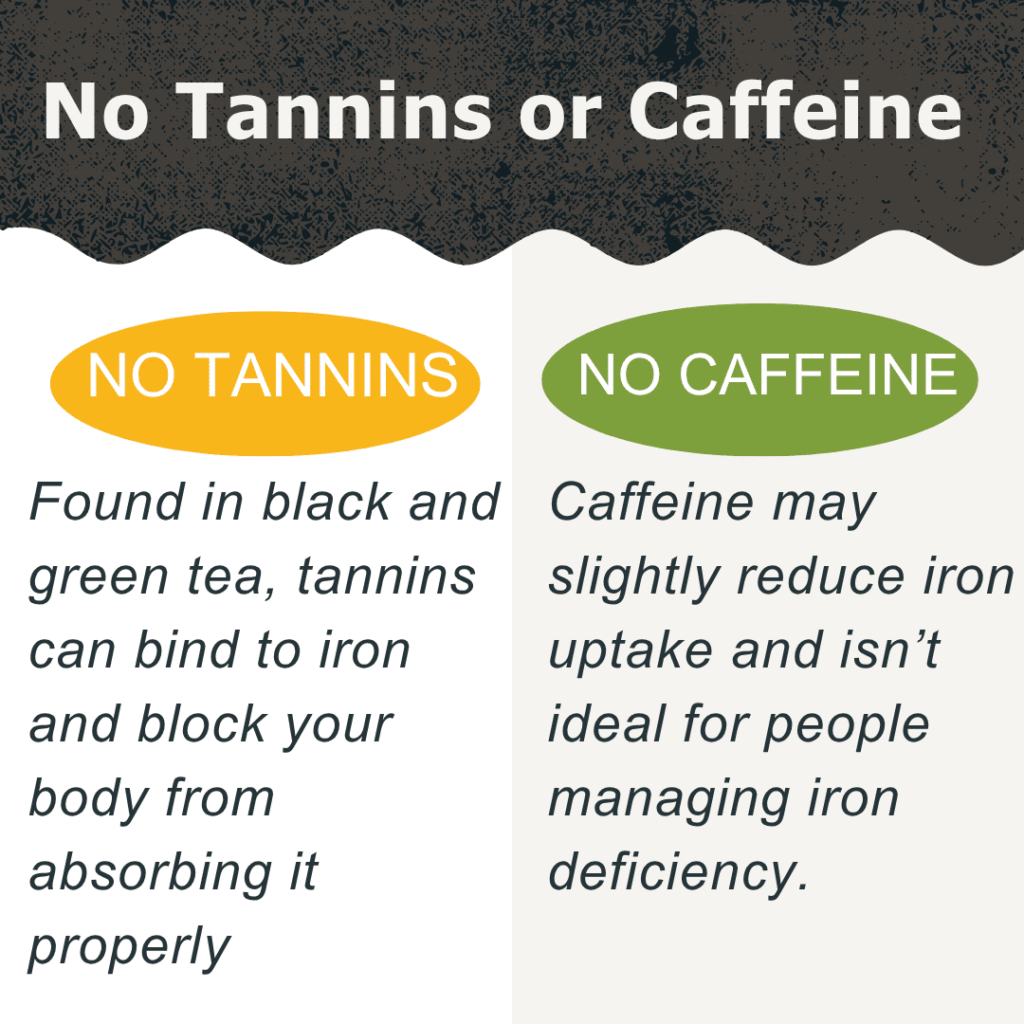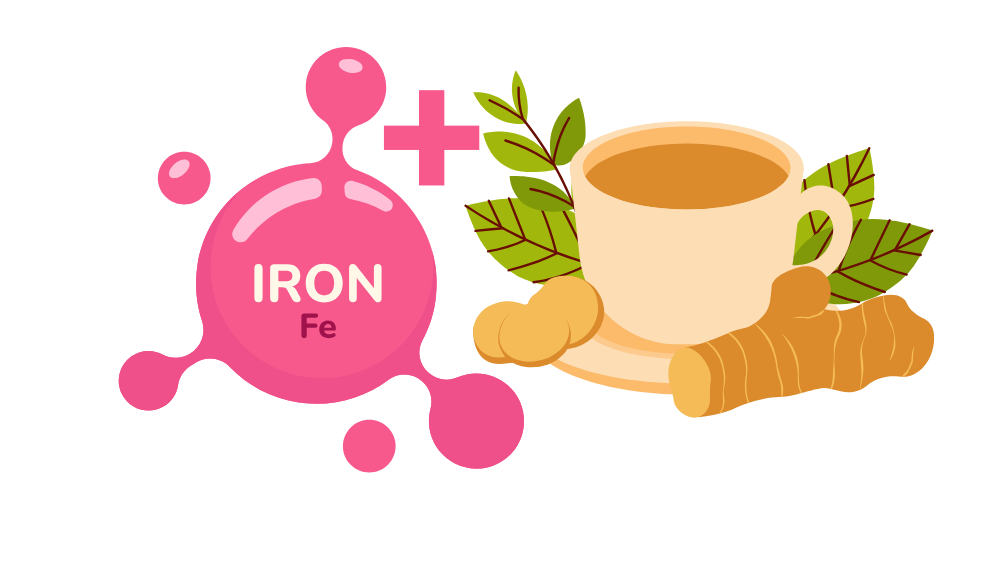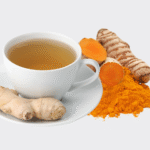Is ginger tea safe or helpful for iron deficiency? Discover how ginger affects iron absorption, when to avoid it, and expert-backed tips for boosting iron naturally. If you’re feeling tired or struggling with low energy, an iron deficiency could be the cause, and you may wonder if ginger tea can help. Ginger tea has digestive and anti-inflammatory benefits, but can it boost iron levels or help people with anemia?. It’s time to. Explore the science behind ginger’s effect on iron absorption, its safety for individuals with iron deficiency, and how to enjoy it without interfering with your iron intake. I’m going to discover the surprising connection between ginger tea and iron health with you.
Quick Answer: Can Ginger Tea Help with Iron Deficiency?
Ginger tea may support iron absorption by improving digestion and reducing inflammation, which helps your body take in nutrients more effectively. However, it is not a direct source of iron and can’t replace iron-rich foods or supplements. For best results, drink ginger tea between meals or alongside iron-rich meals (preferably dairy and caffeine-free), as these substances can inhibit iron absorption in the body.
What Is Iron Deficiency?
Iron deficiency happens when your body doesn’t have enough iron to make healthy red blood cells, which are needed to carry oxygen throughout your body. Their symptoms are constant tiredness, brittle nails, hair loss, pale skin, shortness of breath, and feelings of dizziness or weakness.
Women are more likely to be iron deficient, especially during menstruation, pregnancy, or when following a restrictive diet. Other causes include poor iron absorption due to gastrointestinal issues or an insufficient intake of iron-rich foods.
How Ginger Tea Can Affect Iron Absorption
Ginger tea may not contain iron, but it does play a role in how well your body absorbs it, especially when you eat iron-rich foods. Here’s how:
Ginger Improves Digestion
A healthy digestive system is essential for the human body to absorb nutrients, such as iron. Everybody knows about this. Ginger contains gingerols and shogaols, which help to:
- Stimulate gastric enzymes that break down food.
- Promote bile production, aiding in the digestion of fats and the absorption of nutrients.
- Reduce bloating, which can hinder iron uptake.
When your gut works smoothly, it’s easier for the body to extract iron, especially from plant-based sources like spinach or lentils.
Tip: Try drinking ginger tea 30–60 minutes after consuming an iron-rich meal to support digestion without interfering with iron absorption.
Antioxidants & Anti-Inflammatory Effects
Ginger is rich in antioxidants, such as gingerol and shogaol, which help combat inflammation in the body, particularly in the gut.
Why does this matter for iron?
- Chronic gut inflammation (from stress, poor diet, or conditions like IBS) can interfere with how well your body absorbs nutrients, including iron.
- Ginger’s anti-inflammatory properties may soothe the digestive lining, creating a healthier environment for iron uptake.
In simple terms: A calm, healthy gut = better absorption of the iron you eat.
No Tannins or Caffeine
One primary reason ginger tea is excellent for iron absorption is what it doesn’t contain:

This makes ginger tea a safe, soothing alternative for anyone who wants the digestive benefits of tea without interfering with iron absorption.
Bonus: You can enjoy it any time of day, without worrying about it depleting your iron.
Can Ginger Tea Replace Iron Supplements?
It’s an excellent question. No, ginger tea cannot replace iron supplements because it doesn’t contain iron. However, it may support iron absorption by improving digestion and reducing gut inflammation, which helps your body better absorb iron from food.
Still, if you have moderate to severe iron deficiency, drinking ginger tea alone is not enough. You should follow your doctor’s advice and take iron supplements or make the recommended dietary changes. Ginger tea can be a helpful complement, but not a cure.
Best Ways to Use Ginger Tea If You’re Iron Deficient
Timing Matters
To get the most out of ginger tea when dealing with iron deficiency, drink it after meals, especially those rich in iron (like spinach, lentils, or red meat). This may help your body absorb nutrients more effectively by supporting digestion and reducing inflammation in the gut.
Avoid drinking ginger tea with your iron supplements, as some herbal compounds may slightly interfere with the absorption of iron. Also, try not to pair it with dairy or calcium-rich foods during the same meal, as calcium can compete with iron and reduce the amount your body absorbs.
Combine with Iron-Rich Meals
For better results, drink ginger tea after eating iron-rich meals such as:
- Spinach, lentils, tofu, and red meat
- Combine these with vitamin C-rich foods, such as oranges, strawberries, or bell peppers, to boost iron absorption.
Ginger tea doesn’t supply iron itself, but it supports digestive health, which helps your body absorb more nutrients. It can also help alleviate bloating and heaviness after large meals, making it a brilliant addition to your iron-rich diet.
Avoid These Iron Blockers
To get the most out of iron-rich foods, it’s essential to avoid common blockers that reduce absorption. These include:
- Calcium-rich foods (like milk or cheese)
- Caffeinated beverages (coffee, black tea)
- Phytates and oxalates (found in some grains and leafy greens)
Instead of drinking milk or coffee with meals, opt for ginger tea between meals or shortly after. Its digestive benefits help your body process nutrients more efficiently, without interfering with iron absorption, unlike other drinks.
Pro Tip: Let your meal settle for 30–60 minutes, then sip ginger tea to support absorption and reduce post-meal discomfort.
Risks, Side Effects & When to Avoid Ginger Tea
While ginger tea can support digestion and may aid in iron absorption, it’s not risk-free, especially when consumed in large amounts or in combination with certain medications.
Possible Side Effects
- Too much ginger (especially over 4g/day) can lead to:
- Nausea
- Acid reflux or heartburn
- Stomach upset
When to Be Cautious
- Not a replacement for iron supplements in moderate to severe deficiency. Always consult your doctor for proper diagnosis and treatment.
- Drug interactions: Ginger may interfere with Blood thinners (like warfarin or aspirin) and Diabetes medications (may increase the risk of low blood sugar)
Pregnancy Warning
- Pregnant women should limit their intake of ginger to 1g per day and avoid concentrated extracts without consulting a healthcare professional.
Always speak to your healthcare provider before adding herbal teas like ginger to your routine, especially if you’re on medication, pregnant, or managing a health condition.
Tip: How I Used Ginger Tea During Iron Deficiency Recovery
When I was recovering from iron deficiency, I learned that it’s not just about taking supplements—it’s about how your body absorbs the iron. I started drinking ginger tea with a splash of lemon about 30 minutes after lunch, especially on days when I had eaten spinach or lentils. The tea helped reduce bloating from heavy meals and made me feel more comfortable overall.
I also made minor changes, such as blending iron-rich smoothies with strawberries (rich in vitamin C) and drinking ginger tea afterward. It wasn’t a miracle fix, but over a few weeks, my energy improved, and I finally stopped feeling dizzy by mid-afternoon.
Tip: Build simple routines that support digestion and nutrient absorption. Ginger tea can be a powerful tool when used consistently and wisely.
Conclusion: Is Ginger Tea Good for Iron Deficiency?
Ginger tea isn’t a direct source of iron, but it can play a helpful supporting role in managing iron deficiency, especially when paired with iron-rich foods and a balanced diet. Its ability to improve digestion and reduce inflammation may enhance iron absorption and alleviate bloating, which is often caused by iron supplements or heavy meals. However, it should never replace medical treatment or prescribed iron therapy.
If you’re struggling with low iron levels, consider sipping ginger tea after meals (not during), and avoid pairing it with calcium-rich foods. For optimal results, consult a healthcare provider and develop a comprehensive routine that addresses both your nutritional and overall wellness needs.
Ready to support your iron levels naturally?
- Try soothing, organic ginger tea.
- Learn about and make a routine of the “Iron-Boosting Meal & Tea Plan.”
- Use drinks that have a high amount of iron
- Subscribe to our newsletter for weekly natural wellness tips and an expert tea guide.s
FAQs
Is lemon ginger tea good for iron deficiency?
Lemon ginger tea can support iron absorption, but does not contain iron itself. The vitamin C in lemon may enhance the body’s ability to absorb iron from plant-based foods. At the same time, ginger aids digestion, making it a beneficial addition to an iron-boosting routine.
Can ginger tea cause anemia?
No, ginger tea does not cause anemia. It contains no iron-blocking compounds, such as calcium or tannins. It may help support iron absorption indirectly, though it’s not a cure or primary source of iron.
Is ginger good for iron deficiency?
Ginger is not a source of iron, but it may help enhance iron absorption and improve digestion. Drinking it after meals (especially iron-rich ones) can be a supportive habit during iron deficiency recovery, alongside proper diet and supplements.
Can you take ginger and iron together?
It’s better to drink ginger tea after meals or away from iron supplements. While ginger doesn’t block iron, drinking tea too close to a supplement may slightly interfere with absorption. Allow at least 1 hour for optimal results.
Is ginger high in iron?
No, ginger is not a good source of iron. It contains trace amounts that do not significantly contribute to your daily iron needs. Its main benefit lies in its digestive and anti-inflammatory properties, which can support nutrient absorption and digestion.
Does ginger increase hemoglobin?
Ginger may indirectly support hemoglobin production by improving iron absorption and reducing inflammation. However, it does not directly raise hemoglobin levels. A proper, iron-rich diet and supplementation are key to correcting low hemoglobin levels.


